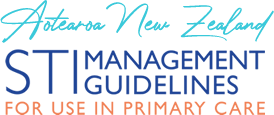Young people
- Rates of chlamydia and gonorrhoea diagnoses in Aotearoa New Zealand are highest among people aged 15-29 years. Māori and Pacific Peoples carry a significantly higher burden in terms of rates of disease
- Young people are often unaware of their risk of infection and that sexually transmitted infections (STIs) are often asymptomatic
- Negotiating to see all young people on their own, discussing limits of confidentiality at the start of each consultation, minimising costs and routinely offering STI screening (using self-collected samples, when appropriate) to all young people can help overcome barriers to STI testing
- Providing sexual health care to adolescents, particularly younger adolescents, should involve a complete psychosocial (HEADSS) risks and strengths assessment, including screening for any past history of sexual abuse or assault, and an assessment of the young person’s capacity for decision making and consent while being aware of child protection issues and mandatory reporting requirements
- The Aotearoa New Zealand Youth’19 survey found that 1% of high school students identified as transgender or non-binary, with a further 0.6% unsure about their gender. These students had compromised health and wellbeing compared with their cisgender peers. Opening discussion about gender identity may begin to address the challenges these young people face, and enable them to access appropriate supports. It is helpful to introduce yourself with your name and the pronouns you use
- It is important to maximise consultations with young people and use them as an opportunity to educate young people about good sexual health practices including safety, condom use, regular screening and contraception
As per sexual health check guideline
- Opportunistically offer STI screening using self-collected swabs (unless symptomatic or examination requested) to all young people at least annually
Special considerations
Privacy
- Ask the young person about the best way to contact them with test results and reminders
Consent
- People aged over 16 years are considered legal adults
- Minors may provide legally effective consent for medical treatment if they are mature enough to understand what is proposed and are capable of expressing their own wishes1
- A female of any age has the right to consent or refuse to give consent to any medical or surgical procedure for the purpose of terminating her pregnancy2
Child protection
- There is no law in Aotearoa New Zealand that makes reporting of sexual abuse mandatory
- The Children, Young Persons and their Families Act 1989 states that ‘[the] welfare and interests of the child or young person shall be the first and paramount consideration.’
- The Crimes Amendment Act 2011, Section 195A Failure to protect child or vulnerable adult states ‘A person is liable for the offence of failing to take reasonable steps to protect a child or vulnerable adult’ if they were aware the person was being abused and failed to take reasonable steps to protect them
- Most health organisations have policies for reporting abuse. Best practice recommends that staff who identify or suspect abuse report their concerns to a statutory agency, the police or Oranga Tamariki
- Decisions to report can be complex and discussion with experienced colleagues and local agencies is often helpful
If test results are positive, refer to relevant STI management guideline
- Consider adherence to treatment when deciding on management
- Offer single dose medication where possible
Even if all test results are negative, use the opportunity to:
- Educate about negotiating safer sex, how to use condoms and risk minimisation
- When appropriate, address contraceptive needs
- Vaccinate for hepatitis B and human papillomavirus (HPV) as required
- Offer reminders for regular screening tests
- Discuss need for cervical screening if aged over 25 years
- 90% of young people attending the practice are tested according to these guidelines
- 100% of young people tested have hepatitis B and HPV vaccination status recorded
- Morris KA, editor. Coles Medical Practice in New Zealand 13th edition 2017.
- Medical Council of New Zealand (MCNZ). Appendix 1. Information, choice of treatment and informed consent. February 2019.

